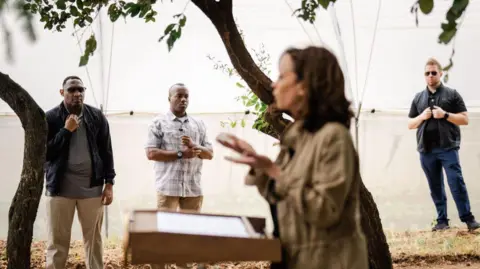President Donald Trump has cancelled former Vice President Kamala Harris' Secret Service detail, seven months after she left office following her unsuccessful presidential campaign.
By law, the US Secret Service provides former vice presidents and their families with six months of protection after their terms end. However, this term can be extended at the discretion of the sitting president, a move that former President Joe Biden reportedly executed before leaving office.
The decision to withdraw Harris's security has ignited controversy, with California Governor Gavin Newsom and Los Angeles Mayor Karen Bass describing it as politically motivated.
Currently, neither Biden nor Harris have publicly explained the reasons behind the extension of her security. According to CNN, Biden extended her protection for an additional year under a previously undisclosed directive.
From a legal standpoint, Biden was within rights to extend the protection, as there is provision for the Secret Service to offer temporary protection if circumstances warrant such action. Ron Kessler, a noted expert on the Secret Service, mentioned that the decision might simply be standard practice in ambiguous situations.
Sources familiar with the situation shared that a recent threat assessment did not reveal significant threats warranting extended protection for Harris. Nevertheless, some members of her team expressed concerns that her unique status—the first female and person of color to serve as vice president—accompanies increased potential for threat.
During her term and candidacy, several individuals have been charged with making threats against her. Notably, one man alleged threats involving a sniper rifle after Harris left office, suggesting political tensions have been especially high.
The recent withdrawal of her detail is timely, as Harris prepares for a nationwide book tour to promote her memoir, 107 Days, centered on her brief presidential bid. Kessler notes that this tour would further stretch the already overburdened Secret Service resources, which is also tasked with securing international dignitaries during the upcoming UN General Assembly in New York.
Harris's removal from the list of protectees extends beyond the presence of agents; it includes a loss of security systems for her residence in Los Angeles and ongoing monitoring of potential threats. The costs associated with security were not publicly disclosed, although private security for high-profile individuals can reach millions annually.
Allegations of political retribution have emerged following the announcement of the removal. Trump's history of withdrawing security for both allies and adversaries raises questions about motivation and the implications of this action for public safety. As former officials like Mike Pompeo and John Bolton faced similar withdrawals, the discourse around Harris's security underscores the importance of safeguarding public officials from politically charged actions.
In contrast to vice presidents, former presidents receive lifetime security, demonstrating a critical distinction in how each position is treated regarding safety measures.















